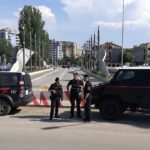- Vučić’s party wins local elections
Tentative results of local elections held on June 2, the list of the ruling Serbian Progressive Party (SNS) led by Aleksndar Vučić won the popular vote in Belgrade, Niš, Novi Sad, and, in general, in the absolute majority of cities and municipalities.
In Belgrade, the Belgrade Tomorrow coalition formed around the SNS sealed 64 of the 110 mandates. The list “I am Belgrade – Start Changes” secured 21 mandates, and “We choose Belgrade” came third with 14 mandates. The fourth is “We are the power of the people” with 10 mandates, and the Russian Party got only one mandate.
On June 2, citizens elected local authorities in 89 cities and municipalities across Serbia. Observers explain the success of the ruling party and the opposition’s failure with a number of factors. The SNS politicized local elections by focusing on the Srebrenica resolution rather than local issues, promoted regional lists under the brand name of President Vučić, and fought practically for every vote on the ground.
At the same time, the opposition stood disunited, failing to coordinate actions. In particular, part of the opposition called for a boycott of the election process, which reduced participation of the protest-inclined electorate in the elections.
- Lamwakers in North Macedonia elect Afrim Gashi Parliament Speaker
Afrim Gashi is the president of the Alternative Albanian party, which was part of the VLEN (VREDI) coalition.
Gashi saw support from parties that were in the opposition but now, following the election, are part of the new parliamentary majority. These are VMRO-DPMNE, which sealed 58 mandates, the VLEN coalition with its 14 mandates, and the ZNAM Movement with six mandates.
These parties are already negotiating the formation of the future government.
Gashi’s election has angered the European Front coalition, which includes the leading party of North Macedonia’s Albanians, the Democratic Union for Integration (DUI). DUI is led by Ali Ahmeti, one of the leaders of the Albanian National Liberation Army (UÇK) during the 2001 armed conflict. According to the DUI, the absence of the Democratic Union for Integration, the leading Albanian party, in the ruling coalition calls into question the very spirit of the Ohrid Agreement, which stopped the armed conflict between Macedonians and Albanians in the early 2000s.
However, the VLEN coalition sharply criticized the stance taken by DUI and its leader Ali Ahmeti, accusing them of attempting to retain power at any cost.
- Preparations start for “peaceful partition” of Bosnia and Herzegovina
The Government of Republika Srpska adopted the Decision on the appointment of the Working Group for the preparation of the draft Agreement on the peaceful secession of Republika Srpska from the Federation of Bosnia and Herzegovina.
On board are Minister of Justice, Deputy Prime Minister, Minister of Internal Affairs, and Prosecutor General of Republika Srpska, Director of the Republican Administration for Geodetic and Property Legal Issues, Director of the Tax Administration, and other RS officials.
The working group is tasked with developing the relevant proposal for the Agreement on the Peaceful Secession of Republika Srpska from the Federation of Bosnia and Herzegovina, which the Government of Republika Srpska will put forward before the RS People’s Assembly.
Observers believe the RS initiative serves as a tool for putting pressure on the international coalition and Sarajevo. At the same time, the start of the “peaceful partition of BiH”, even if it remains a purely declarative step, has a destabilizing effect on the entire region.
- Slovenia, Poland, Romania citizens living in BiH not eligible to vote in EP election
On June 3, Serbian ministers Staša Košarac, Srdjan Amidžić, and Nenad Nešić barred citizens of Slovenia, Poland, and Romania residing in Bosnia and Herzegovina from voting in the European Parliament election.
The proposal of the Ministry of Foreign Affairs to the BiH Council of Ministers, suggesting that diplomatic notes be accepted from the embassies of Slovenia, Poland, and Romania to agree on organizing the vote on the relevant diplomatic premises, saw no sufficient support.
Voting on the issue of organizing elections is usually a plain routine based on reciprocity and the Vienna Convention, but this time ministers representing the Bosnian Serbs apparently decided to block the opening of polling stations to protest the three countries’ recent support for the UN General Assembly Resolution on the Srebrenica genocide.
- Fifty BTR-80A armored personnel carriers arrive from Hungary to Serbia
These are 8×8 wheeled armored vehicles armed with Soviet-Russian 30mm 2A72 automatic guns.
Nearly 20 APCs will transferred to the barracks in Pancevo. Thirty vehicles will be overhauled before they become part of an armored reconnaissance battalion based in Niš.
As reported by the Serbian media, the batch of armored vehicles is “a gift from the Prime Minister of Hungary, Viktor Orbán, to the President of Serbia, Aleksandar Vučić.”
In a cover letter sent on the occasion, Prime Minister Orbán underlined the high level of cooperation between the two nations, noting that it has been achieved thanks to the leadership of Serbia and President Aleksandar Vučić.
- Iran intends to invest in high-tech projects in BiH
Acting Director of the Foreign Investment Promotion Agency of Bosnia and Herzegovina (FIPA), Marko Kubatlija (representative from Republika Srpska) met with the delegation of Iran’s Mobarekeh Steel Technology and Innovation Support and Development Fund.
The Fund represents 600 companies operating in the technology park in Isfahan, and 40 companies intend to invest outside Iran, as per media reports. Iranian investors are interested in exploring investment opportunities in Bosnia and Herzegovina, especially in metal industry, steelworks, robotics, and artificial intelligence sectors.
FIPA representatives reportedly briefed Iranian delegation on the local business environment, legal framework, taxation, and education system, as well as metalworking sector projects, current trends and existing successful companies operating in the sector. They also organized meetings and tours of possible investment sites.
Given the current geopolitical situation, it cannot be ruled out that this is about Iran and RS’s cooperation in the field of dual-use tech.



